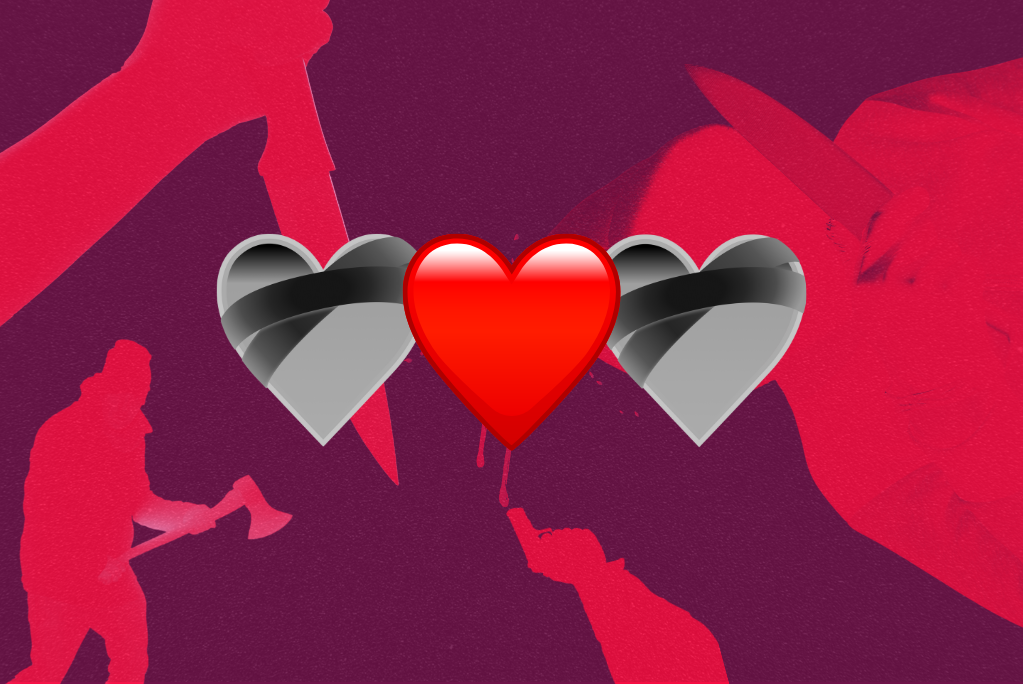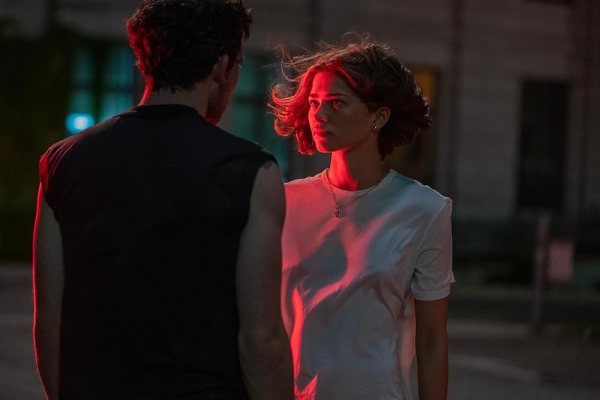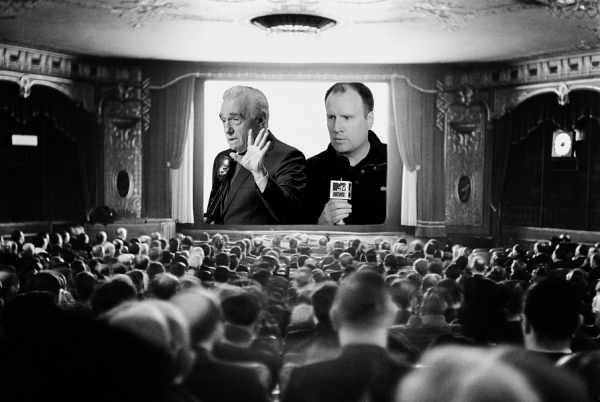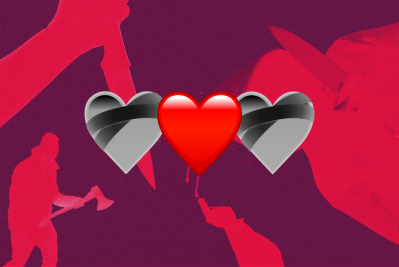This month has brought a surprising uptick in a more gory kind of date flick. Companion is a sci-fi thriller about a companion robot who turns against her owner and blows his brains out. Heart Eyes follows a slasher villain named Heart Eyes who kills couples on Valentine’s Day. Love Hurts is about a mob enforcer who kills his old crew to save an old flame.
On the one hand, violence with a side of love is nothing new for Hollywood. The French New Wave filmmaker Jean-Luc Godard famously said, “All you need for a movie is a gun and a girl.” Slasher killers like Jason from the Friday the 13th franchise have always made a point to interrupt teens having sex. Action films have often relied upon love as a motivation for the often gun-toting and sucker-punching hero. And many post-#MeToo films like A Promising Young Woman have pulled on romcom cliches to establish those as fantasies women have been brainwashed by to get them to submit to abusive relationships.
But all the gore seems to mean a little bit more in our modern society. Fear is a growing part of the American romantic landscape: The #MeToo movement, for example, has made clear the dangers women face in the dating scene, and sensitized men to the chances of being accused of predatory or creepy behavior. As Gen Z culture critic Freya India points out, social media has become an endless feedback loop of warnings against the dangers of romantic encounters.
Social media is full of young women warning each other and listing out red flags and reasons why you should dump him or dodge commitment. He compliments you a lot? Love-bombing. Says I miss you too soon? Run. Approaches you in person? Predator. It’s all so cynical. It’s all about how not to catch feelings; ways not to get attached; how “you’re not gonna get hurt if you have another man waiting”!
Companion follows and reinforces these fears. Leading lady and robot Iris’s owner Josh is a prototypical grab bag of abusive boyfriend tropes whose “nice guy” persona hides entitlement and control freak tendencies. Iris has to learn to see his love for her as fake and her love for him as programming, in order to save her life and overcome him.
Meanwhile, Heart Eyes uses this environment of fear as the backdrop of its story. The film starts out with its heroine watching the news talk about the Heart Eyes Killer on the loose and she and her friends discussing whether it’s safe to go out for Valentine’s Day. When she explains why she isn’t looking for love, she says it’s because it’s a lie. Yes, some “lucky” people find true love and lasting love, but the other “99 percent of us” get cheated on or lose our partner.
The problem is that a lot of this fear is more fantasy than the rom com tropes they parody. The world today is not as dangerous as we often hear: Violent crime has been consistently going down since the early 90s, and continues to do so despite a spike in 2020. Still, we continue to believe, when asked, that violent crime is getting worse. Likewise, the idea that “99 percent” of relationships fail is a known falsehood. The divorce rate has long been likely under 50 percent and continues to go down, and married people are happier than those of any other relationship status.
What causes the myth that things are worse than they are? A lot of it is simply the media we consume and how we consume it. Pulitzer Prize-winning writer Walt Hickey notes in his 2023 book You Are What You Watch that TV and movies portray violence partially because it attracts eyeballs, but that the more violent media we consume, the more violent we believe the world is. Psychologist Mike Brown made a similar point for Psychology Today in 2020 about the internet and social media, noting that 24-hour access to depressing and scary information feeds an evolutionary mechanism known as negativity bias—that is, our tendency to focus on the negative over the positive.
Hollywood’s own portrayal of love also probably bears some blame. I’ve always found it odd that romcoms have a reputation for being unrealistic, given it’s probably the most realistic popular genre we have. Most of us are not going to encounter—let alone escape—a serial killer. But most of us will have some version of a rom com in our life. Most of us will get married, and most of us who do will stay together with that person.
But despite how realistic love is, Hollywood insists on treating it in a fantastical way. The way the characters meet is often random and far-fetched (such as accidentally meeting a pop star who immediately falls in love with you like The Idea of You), the problems they have are trivial misunderstandings—sometimes mind-numbingly so, like in Anyone But You—and the ways they overcome them are unrealistic as well, often amounting to “sleep around with enough people until you find the person that makes you feel particularly fluttery” such as in 27 Dresses or How I Met Your Mother. As I’ve written before, when people apply this to their lives, it doesn’t work, leading them to be more pessimistic about love.
The best classic romances have realistic obstacles to overcome, with resolutions that feel believable. Pride and Prejudice was set against the backdrop of families becoming destitute if the women didn’t make a match, the barriers were society’s rules on how to express yourself to each other, and the solution was to overcome your own fear and pride. When Harry Met Sally was set against the backdrop of a very real society where relations between the sexes were so fractured that each individual had to make up their own rules (“e.g., men and women can’t be friends”) and find a way through that confusion.
The problem is, it takes living in the real world and having real relationships to create authentic stakes, and portray believable ways of overcoming them. When Harry Met Sally was originally going to end with the two leads going their separate ways, until the director Rob Reiner fell in love while making the movie. But, as journalist Richard Rushfield recently wrote, Hollywood’s careerism and hustle culture mean storytellers have less personal experience in successful relationships than the average person. So the stakes have to be serial killers or monsters, and the solutions have to be an axe to the head or kick to the face. And that, in turn, means that romance will be more firmly placed within the realm of fantasy.
Ideology can also be a barrier. Most of the things that certain social scientists—for example, Brad Wilcox at the American Enterprise Institute in his book Get Married—have found make for successful and happy relationships are deeply conservative-coded, including going to church, and putting the relationship’s success over personal freedom and fulfillment. If a creative were to suggest a story based on these behaviors, it would look pretty conservative—and Hollywood is anything but. But as culture critic Rob Henderson points out, while elites in Hollywood and elsewhere often have traditional lives themselves, they gain status by promoting the debunked idea that all family arrangements have equal outcomes. And that further entrenches less-than-ideal romantic and familial norms in show business.
Don’t get me wrong. I love action movies and horror films, and I unapologetically adored Love Hurts and really enjoyed the mashup of romance and gore. But there is a problem when every Hollywood romance is reduced to something bordering on fantasy, not reality—it sends the depressing and destructive message that love is at best unrealistic and at worst, toying with death.
We live in a time ripe for the next great love story. The stakes are high, and the barriers real. Loneliness is rampant and, as fewer and fewer people get together, the threat of population collapse looms. Whoever writes this great love story will be a hero. But first they probably have to live it.






Please note that we at The Dispatch hold ourselves, our work, and our commenters to a higher standard than other places on the internet. We welcome comments that foster genuine debate or discussion—including comments critical of us or our work—but responses that include ad hominem attacks on fellow Dispatch members or are intended to stoke fear and anger may be moderated.
With your membership, you only have the ability to comment on The Morning Dispatch articles. Consider upgrading to join the conversation everywhere.